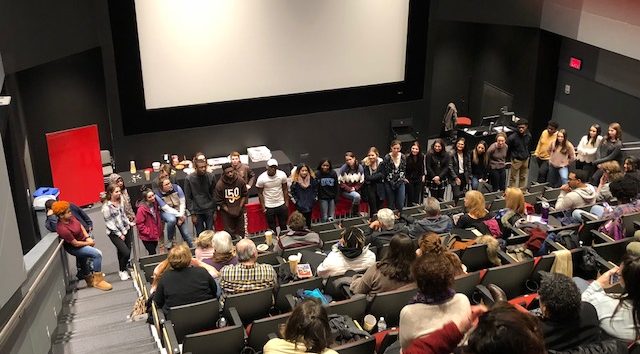I am a film and media and theater double major. I see the world through the way we shape it. In that context, I am a person who believes that the world is what we make it. When we decide to get up and create the world through the lens we see it in, we mirror how everything looks through those decisions. When we follow the societal norm of gender roles, and the ‘American dream’ we lose sight of our lives and how we want it to be. For me being a film student, I have the world in my hands to manipulate and transform it into whatever I want. In theater and film, we are creators and enactors. We put our vision into play and become the leaders of our own destined world which appeals to me more than anything in life. In approaching issues or topics, I think about how I can flip it to become something that tells the story I want to lead. I find it most interesting when anything I encounter can be made into my own personal story. I try to use my own personal life story to help come up with ideas to bring my vision to life, and use different methods of filming, in terms of visual and sound, to help enhance how the story can be explained to others who may or may not have similar experiences or understanding of my film. I’m interested in films that depict the lives of people that share similar experiences as me. I like to see stories about minorities and how they overcome a collective struggle, or examining more into why they do something that is a part of their culture. It’s nice to see how they string together films to help explain a cultural understanding to people of the ‘outside’ ethnicity. If I could tell a story in the Lehigh valley area, I would either explore the differences of the minority area of Easton and the downtown area, or into Bethlehem exploring musikfest and how it generates a cultural experience for all types of people living in that area.
Monthly Archives: September 2017
Documentarian ~
As a documentarian, I’m an entertainer of real life events. I document fun and live events that are used as memories for later to look back on. It doesn’t happen a lot, but mostly when I’m around friends in a big group or out at events like a concert. I think it’s important to have things to look back on years later and see how we’ve grown and the experiences that helped build friendships or moments that will last in our hearts forever. Building a collection of memories serve as a reminder of the things that create good things in your life around positive vibes and builds a collection of all things that are outside of the normal life you live. It’s an escape from the regular routine schedule that you are used to and give you the chance to have a greater experience to remember. In turn, I will never document something bad that happens in my life because in the moment of turmoil it is a reminder of something that I don’t want to happen in my life anymore or to look back on and know that it wasn’t good times. Most people who use their phones or cameras, will use the multimedia they have and record family gatherings or moments where there are more smiles than anything else.
9/4 class reflection
I am normally someone who likes to plan, take time, think, and outline whatever it is I’m about to tackle. For this reason, last week’s class was good for me in terms of being thrown out of my comfort zone and having to quickly think and act in a group of people I had never met. I liked the task we were given, including having the short time constraint that made the groups quickly bond, brainstorm, shoot, and edit. Although I have taken one class on documentary and podcast making, I still consider myself inexperienced behind the camera, so Monday’s class helped to refresh my memory while also teaching me certain things I hadn’t learned. Aside from this I was also able to learn about some of my classmates and get insights about themselves, their schools, and their future goals. Overall, I enjoyed this assignment and although we had some technical difficulties, I was happy with the end product and hope we can continue to learn and improve on the next task.
A True Intro to Documentary: Pets Edition
Monday’s Documentary
My experience with producing the documentary last Monday was very enjoyable. I had a good time collaborating with the group members and learned some editing tips from a few of them. Once we chose the idea to talk about pets, we went with the first logical idea, our dead pets. But including a comedic style to the film as well, so the production wouldn’t be depressing. As soon as we started recording, it just went smoothly. We each had our own stories of our deceased animals, four anecdotes that were good on their own, but together made a hilarious film. We learned some unique info about each other and produce something nice. From this experience, I realized that documenting is as much as providing a stance for the viewer as it is to deliver information that he/she is intrigued in knowing.
Second Life
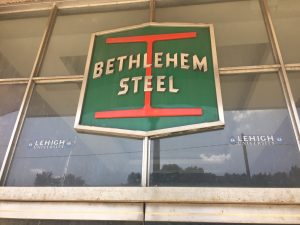
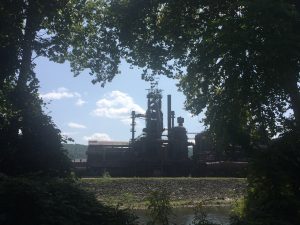
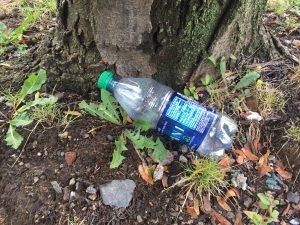
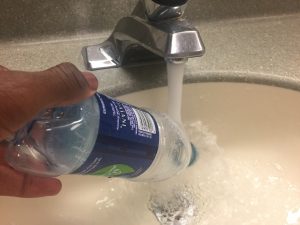
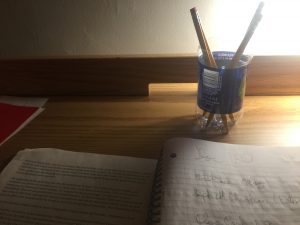
A View From The Paper Frame
Besides the glances I would get from people walking nearby, I had a nice time viewing places around Bethlehem with a cutout frame. After a while, my senses would only focus on what I’m seeing from the frame, as if everything disappeared except the landscape that was in the small dimension. The experiment felt like seeing things through a camera, where the focus was solely on the objects and people in the lens. If I wanted to see something else or avoid stumbling, I would have to constantly shift the frame, giving emphasis to another part of the landscape. Lastly, I felt focused on more details throughout the frame, such as checking out the spine of a leaf or a shoe imprint in mud. When all things are said and done, what I view in the camera will be what’s focused on by the audience and that’s what I need to keep in mind when documenting later.
Going for the Environment
When I view the world, I see plenty of good things in it. Good people living their lives in beautiful areas around the world. But it would be naive of me to think there aren’t as many disparities in the world as there are positive moments. Two disparities, poverty and pollution, are both connected by the same action, the extraction of resources. Just as the majority resources used today originate from nature, they are also needed in everyday life, as the basis for new medicine, technology, and infrastructure. However, these resources are not renewable, and at the rate we use them, they’ll eventually not be able to sustain us. That’s when the problems will get severe. Knowing this information, I chose Environmental Science to protect people from pollution and to come up with sustainable solutions that’ll not deplete the environment. With documentary, I can present the issues of exploitation directly and discuss why it is important to be sustainable.
Being a Documentarian
As a documentarian, I seek to learn and document social issues within Bethlehem. Specifically, the “food desert” within the city, where residents are lacking fresh meats and produce where they live, having to drive outside the city to access these necessities. I want to investigate why it is that way, the effects of the problem, and what’s being done to stop this issue. By applying a spotlight to the food issue, I can raise awareness of the problem and provide recognition to the programs that are trying to change this issue. Also I’ll get the feeling of helping the community as well as creating another connection between the students and the residents of Bethlehem.
Editing Power
Monday night was an interesting night. Being told to cut, shoot, and edit all under a time crunch leads to things never working out as expected. At first it was awkward trying to figure out who to shoot and what to say, but after a few moments we were rolling. We originally wanted to talk about pet death and how sad we were when we lost our pets and the weird ways in which they died, but when we sat down in our editing bay, we lost all of that. We went from filming horror to humor. I did not expect that or see that coming from what we shot, but it was there. I was shocked by the power of editing. All it took was taking short sentences slightly out of context. Discovering this worried me more than calmed me.
The power of editing worried me because it made me realize how easy it is to change the tone of an interview all in the editing booth. People were talking about sad topics with a dark tone, but we presented out clip as a funny topic with a light tone. What we presented was not the truth and we turned the truth into lies in a few short minutes. That worries me because I now know that interviews can be manipulated to work for anyone’s point. Works can be taken out of context. One part of a sentence could be included and another neglected. Their is true power with editing and with great power comes great responsibility.
